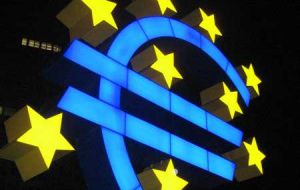MercoPress. South Atlantic News Agency
EU October inflation down anticipates further rate cut

European inflation edged down in October according to data released Friday helping to pave the way for the European Central Bank to deliver another hefty rate cut next week.
The EU statistics office said its preliminary estimate of annual inflation in the 15-member Euro-zone edged down to 3.2% this month from 3.6% in September. This is the lowest inflation rate since January and substantially down from the 4% it hit in July. The drop in euro zone inflation follows the recent fall in energy costs, with oil prices hovering at about 65 USD a barrel in late European trading Thursday on the prospects that slowing global economic growth will curb demand. In July, oil prices were heading towards 150 USD a barrel. Analysts have predicted that the drop in energy prices and slowing global growth could result in further falls in inflation in the coming months. In harmonized European terms, annual German inflation fell from 3% in September to 2.5% this month, its lowest in more than a year. A grim economic outlook combined with dwindling inflation gives the ECB scope to follow up the 50-basis cut it delivered in July as part of a coordinated action by the world's leading central banks to shore up the global economy. Confirming this forecast the German press reports that the ECB Shadow Council recommends that the ECB cut its key interest rate by a full percentage point to 2.75% at its next policy meeting on November 6. The decision was taken with eight votes in favour while the seven remaining members preferred a recommendation of a half point cut. Behind the unprecedented recommendation is a very sharp drop in growth prospects and a consensus that the euro area is facing a recession. The recommendation of the Shadow Council comes after the ECB cut interest rates by half a percentage point to 3.75 percent on October 8 in a coordinated action with other central banks. Even the least pessimistic forecasters on the Shadow Council agree that the Euro area is facing a recession. The average growth forecast for 2009 plunged from plus 0.8% to minus 0.4%. Members now expect the decline in commodity prices and the decline in demand to push down inflation back below two percent on average next year. The July the economic climate in the euro zone has continued to worsen with business confidence in Germany and France falling sharply amid signs that consumers in the currency bloc's two biggest economies were also growing concerned about a looming recession. Economic confidence in Europe plummeted in October to its lowest level in 15 years, a key survey released Thursday said.




Top Comments
Disclaimer & comment rulesCommenting for this story is now closed.
If you have a Facebook account, become a fan and comment on our Facebook Page!